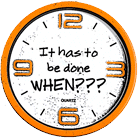Dyspraxia, a form of developmental coordination disorder (DCD), is a common disorder affecting fine and/or gross motor coordination in children and adults. People with dyspraxia may experience some of the following:
 problems throwing and catching, riding a bike, DIY
problems throwing and catching, riding a bike, DIY- poor spatial awareness, being called clumsy, dropping and spilling things, getting lost
- difficulties with writing neatly and quickly
- poor balance
- difficulties with personal organisation, planning and time management
- poor short-term memory
- difficulty telling left from right
- slow speed of processing information
If you feel your child shows signs of dyspraxia you should contact your GP for a medical assessment. However in adults and young people aged 16 and over dyspraxia is also classed as a specific learning difficulty because the problems faced with planning, organisation etc can severely impact study or work.
If you are having a full diagnostic assessment for dyslexia I will consider dyspraxia as part of the assessment at no extra cost. Indeed for a full assessment for dyspraxia, dyslexia is also considered because the two conditions are often seen in the same people.
Full diagnostic assessment for dyspraxia for adults and young people aged 16 and over £375
Dyspraxia assessments usually take about 2 hours and include a detailed history of the development of fine and gross motor skills. The assessment also includes tests for underlying ability, memory, processing speed and literacy skills. All the tests are standardised and so provide evidence of performance relative to a “norm”.
After the assessment a detailed written report of findings and recommendations is produced. The report is usually available within one week of the assessment and I aim to make it understandable and jargon-free!
If verbal feedback and discussion are required after the report has been read then this can be arranged at no extra charge.
Although there is no cure for dyspraxia, there are therapies that can help you cope with your condition and be successful in your studies, work and home life, such as:
- keep fit – you may find regular exercise helps with co-ordination
- learn how to use a computer or laptop if writing by hand is difficult
- use a calendar or diary to improve your organisation – you may be able to synchronise this with your phone and computer
- seek out support in employment through programmes such as Access to Work from Jobcentre Plus
If a dyspraxia assessment is done as part of a diagnostic assessment for dyslexia or dyscalculia, there will be an additional charge of £50, making the total £425.

